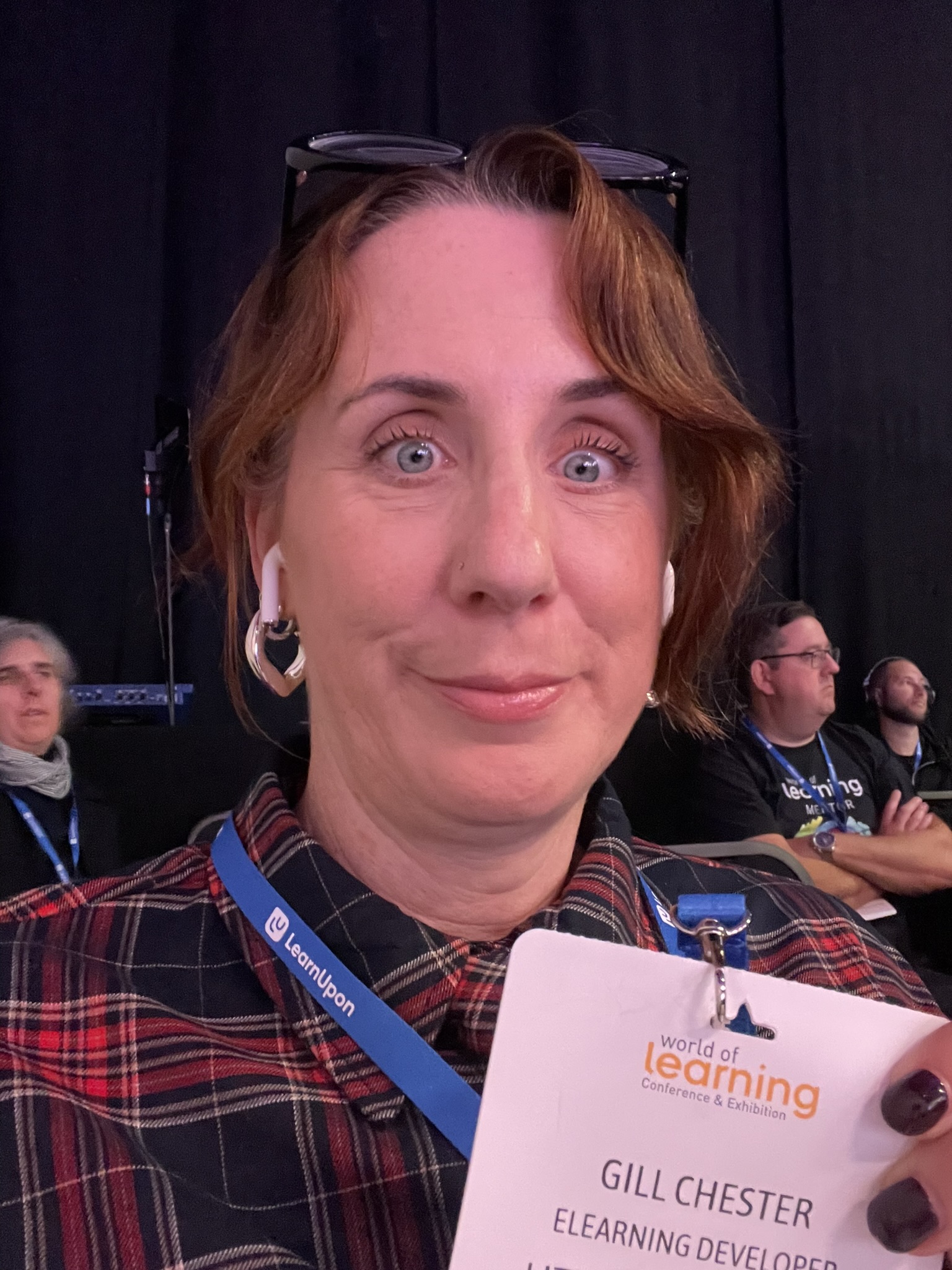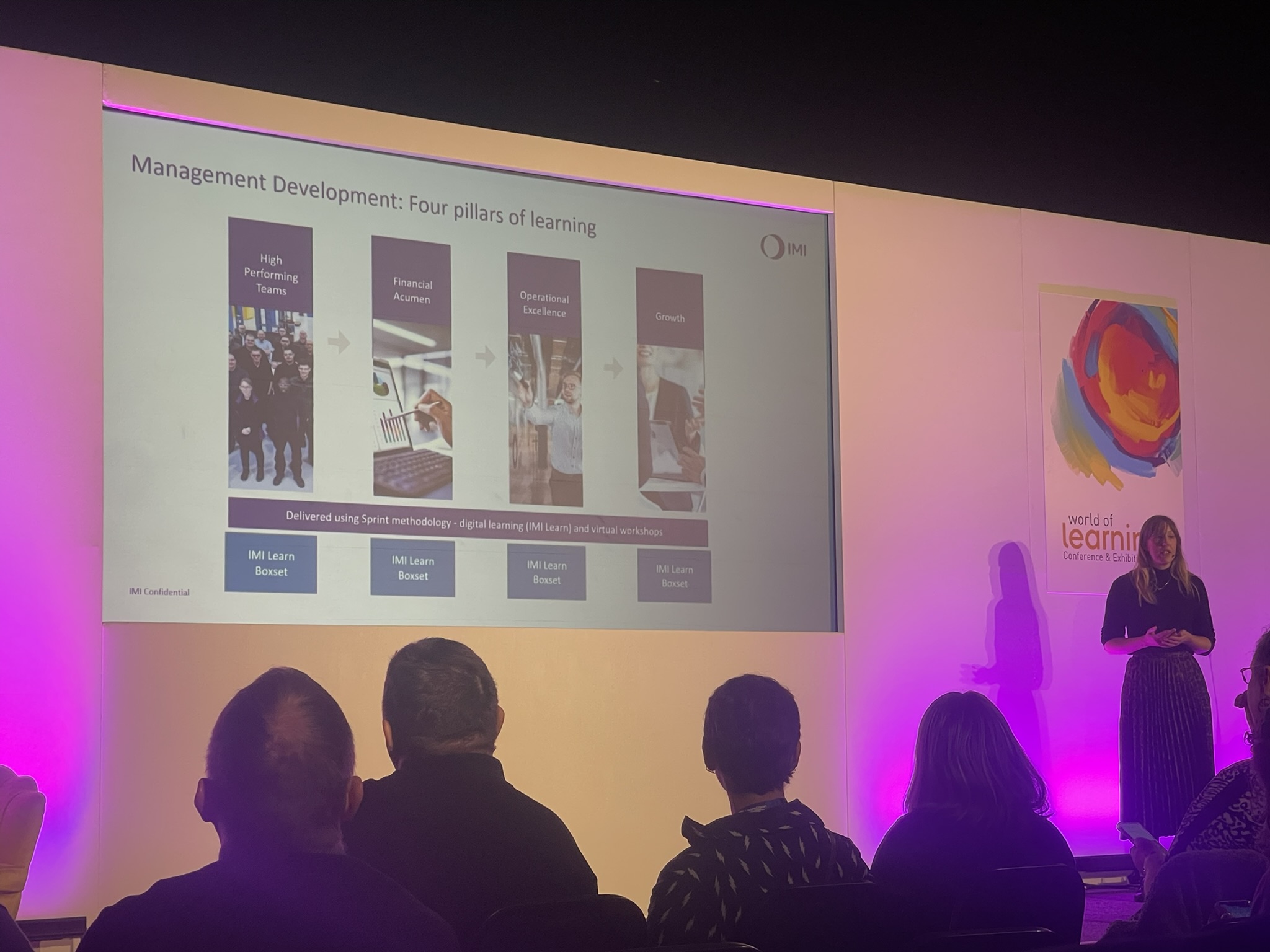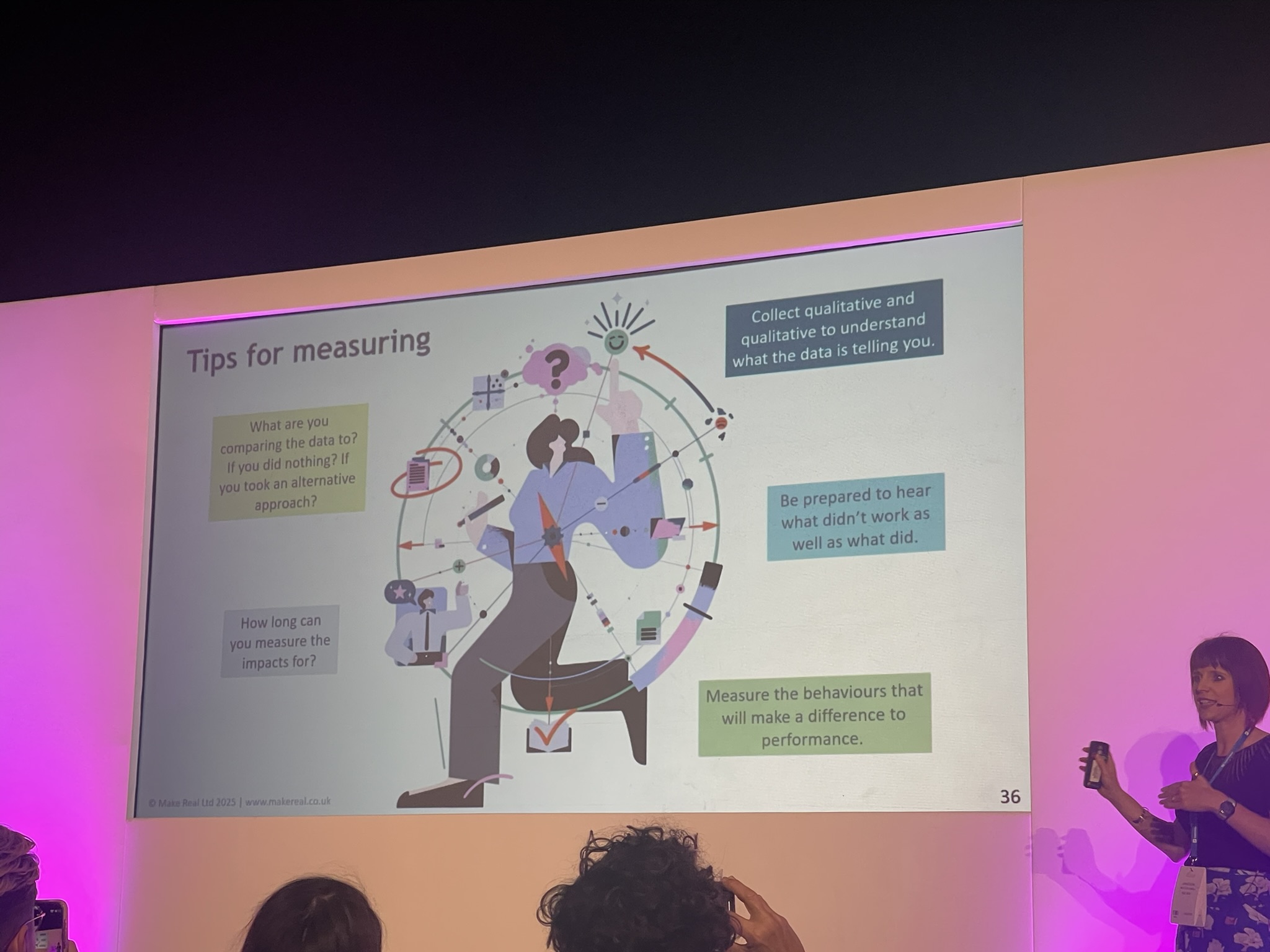Insights from day 1 of the World of Learning Conference 2025
Gill Chester shares key insights and takeaways from the first day of the World of Learning 2025 Conference, highlighting what’s most relevant for charity L&D professionals.
The World of Learning Conference & Exhibition is one of my favourite events in the L&D calendar, obviously behind the best conference of the year run by the Charity Learning Consortium! It’s one of those rare conferences that feels genuinely welcoming, is easy to navigate and has a good connection (not separation) with the exhibition. In this blog post, I’ll summarise each of the sessions I attended and try to offer some takeaways for L&D folk working in charities.
Session: Speaking their language: Aligning learning with what matters to the C-suite
Claire Kennady (Head of Learning & Development, IMI)
The first day kicked off with a pre-conference session from Claire Kennady on engaging senior leaders. I’m currently writing a session myself on a similar topic, so even at 9am, this session had me leaning forward. Claire shared a practical and refreshingly honest case study about how she got senior leaders within her organisation to care about learning, as their general response was always, “This isn’t a priority right now.”
Claire and her colleagues started talking to operational leaders about the problems that kept them up at night. By focusing on business performance rather than learning, they discovered a shared concern around financial acumen. Managers were making day-to-day decisions that affected cash flow, inventory, and profitability, but without understanding how these connected.
Through curiosity and questioning, not selling, L&D became part of the solution. The result was a management development programme built around the real operational challenges of the business, co-created with finance leaders and managers on the ground. The programme was presented to learners using the language of the business. Engagement soared, and L&D was invited into future strategy conversations, not to talk about training, but to talk business.
Key Insights for Charity L&D Professionals:
- Ask before you tell. Understand what matters to stakeholders before proposing learning solutions.
- Speak their language. Frame learning as a response to organisational pain points, not as an abstract good.
- Involve leaders early. Co-create programmes so they reflect real priorities, not assumptions.
- Stay curious. Asking what and why uncovers insights that shape meaningful learning outcomes.
- Prove your impact. When learning solves business problems, your seat at the table comes naturally.
Shameless plug, but if you’re looking for more ideas on how to do this, join me at the Charity Learning Consortium Conference in November 2025 for my session ‘Clear goals to prove value’ where I’ll provide practical advice on how to do this in your charity… and reference Claire’s work at IMI.
Keynote: Learning in flux: Trust, technology and the human response to change
Thimon de Jong (Founder, Whetston)
It was then time for the opening keynote from Thimon de Jong, who was both insightful and entertaining. His session was a mix of AI music, humour, neuroscience, and cultural commentary that explored how learning happens in a world now in constant crisis and rapid change.
After a few technical issues, he managed to start his AI-generated walk-on song, which he used to make a serious point: people are tired. He told us we were in a “polycrisis”… a world where one crisis follows another, resulting in low mental energy. Which means learning requires more effort than ever. Using global data, he showed that younger generations are struggling most with mental wellbeing, while the older generation (people my age!) are avoiding the mental health dip normally associated with the midlife crisis. The issue is that it’s older people in organisations who are making the decisions, potentially unaware of the mental health issues facing the majority of the people within the organisation. This disconnect, he argued, affects motivation and engagement in the workplace.
Thimon encouraged leaders to respond with empathy rather than judgment, and to understand the “fear for the future” many young people feel. He explored the growing issues of AI anxiety (not understanding this new technology) and AI shame (fear of being judged for using it). He also highlighted the mental labour carried by younger people who worry they couldn’t complete certain tasks without the support of AI, something older workers don’t feel because they have done that type of work for years and are confident in their skills.
He then shared some simple ways to build trust and confidence across generations, including reverse mentoring and open conversations about mental health. Side note, I’ve been reflecting on a point made recently that we need to take care when placing additional mental labour and pressure on young people when using reverse mentoring. They argued that reverse mentoring should focus on sharing perspectives rather than on age. Just because someone is young doesn’t necessarily mean they’re more technically skilled than someone older. Still, his point is a useful one when it comes to generational understanding and empathy.
His closing story about the invention of the automatic elevator in 1940’s America offered an engaging metaphor for learning innovation. People often resist change not because it’s faulty, but because it’s unfamiliar. He explained the solution used to get people into unmanned lifts was to play a bit of music and add a mirror (to distract them), to add a call and stop button (to provide a sense of control) and advertising that showed not the early adopters but the group least likely to get in the lift.
Key Insights for Charity L&D Professionals:
- Energy matters. People can’t learn if they’re mentally exhausted.
- Empathy over judgment. Younger staff face different pressures and fears.
- Talk about AI. Address both the anxiety and the excitement it creates.
- Encourage reverse mentoring. Fresh perspectives bridge generational gaps.
- Design for emotion. Build trust, provide control, introduce some distraction and ensure you show the known detractors, not the usual adopters.
Session: Measuring the value of learning innovation
Jade Mountain (Director – Strategic Digital Learning Solutions, London Business School)
Sophie Costin (Director of Learning, Make Real)
This session promised insights into measuring the value of learning innovation but focused mainly on a case study of an AI-powered storytelling practice tool developed by London Business School in partnership with Make Real. While I had previously come across this project at the Learning Network Conference in November, it was valuable to see it presented in a different context and hear additional perspectives.
The tool uses emotional recognition AI to give learners real-time feedback on their performance during networking conversations. This feedback covers their tone, energy, and engagement, helping them reflect on how they come across. The research behind the project was robust, involving control groups, expert assessment, and multiple iterations to refine both the tool and the data it produced.
Although it didn’t fully address how to measure learning innovation more broadly, the case study offered useful reminders about the value of testing, collecting both qualitative and quantitative data, and being open to uncomfortable feedback.
Key Insights for Charity L&D Professionals:
- Evidence matters. Build measurement into your projects from the start, not at the end.
- Accept imperfection. Innovation requires iteration, not perfection.
- Use pilots as proof points. A small success can open doors to larger investment.
- Stay curious. Robust research reveals nuance, showing not just what works but why.
- Tell the story. Even data needs a human narrative to have a real impact.
Session: Designing mandatory learning that works
Tori Parsons (Head of Line of Service Learning Design, PwC)
Sam Taylor (Learning Strategy Consultant)
This session focused on how to make compliance and other mandatory learning more meaningful. The presenters, both with backgrounds in regulated industries, shared examples from banking, retail, and engineering, along with a mix of familiar advice and practical reminders.
Their main argument was that mandatory training is often the only digital learning many employees experience, so it should set the tone for how learning is viewed in the organisation. Like us, they encourage tailoring learning to different audiences, keeping content performance-focused, using only tests to prove knowledge (instead of repeating information and then testing) and using quiz results to offer teams additional support based on gaps in their knowledge.
Key Insights for Charity L&D Professionals:
- Challenge the default. Not everything labelled mandatory needs to be a course.
- Tailor content. Different roles need different messages and levels of depth.
- Focus on behaviour, not facts. The aim is safer or more ethical practice, not box-ticking.
- Embed learning. Use follow-up and discussion to turn compliance into action.
- Use sponsorship. Visible leadership support adds credibility and engagement.

About Gill Chester
Gill is passionate about helping charities and not-for-profits create learning experiences that truly make a difference. As the founder and Director of Little Man Project, an award-winning company she started in 2010, she leads a talented team developing creative, effective elearning for organisations around the world. With over 25 years’ experience, Gill loves building lasting partnerships and finding new ways to help teams learn, grow, and thrive.
Don’t miss part 2 of this blog, where Gill shares her insights from day 2 of the World of Learning Conference.

CL Consortium Ltd
Vine House, Selsley Road,
Stroud, GL5 5NN
The Charity Mentoring Network: A community platform that connects organisations, staff and volunteers together.



